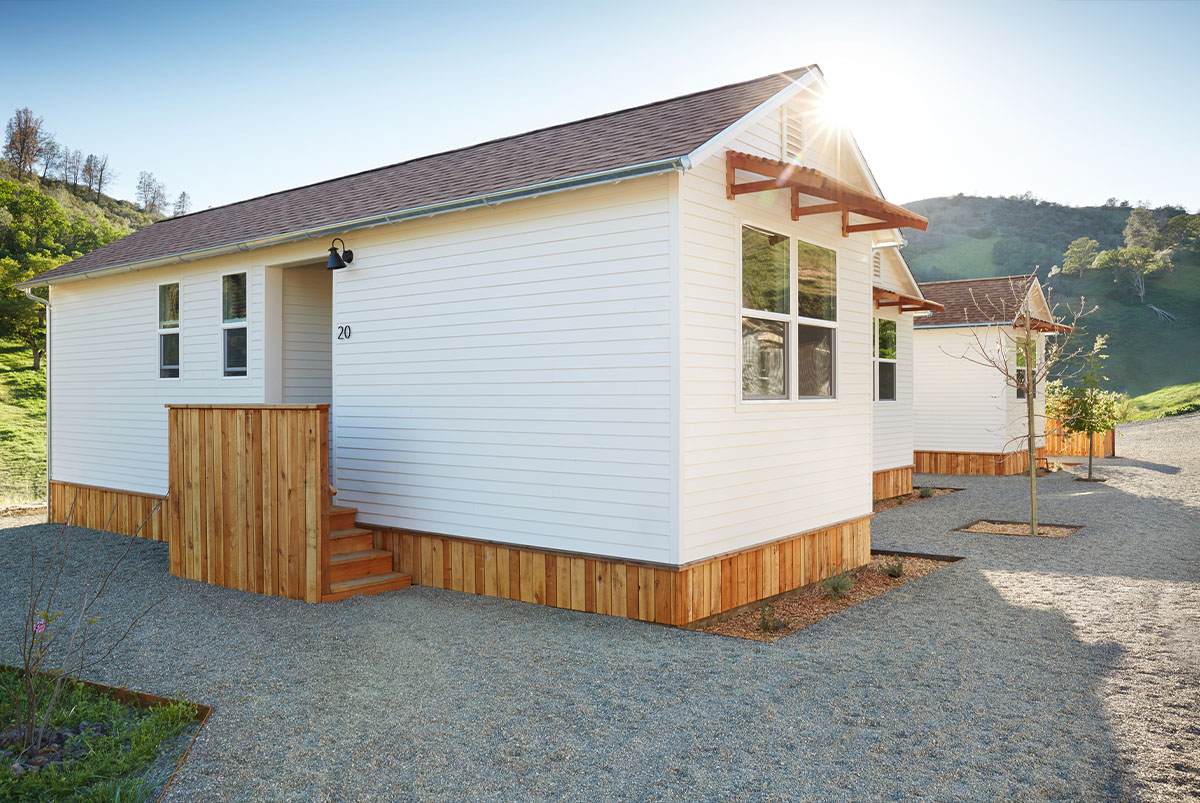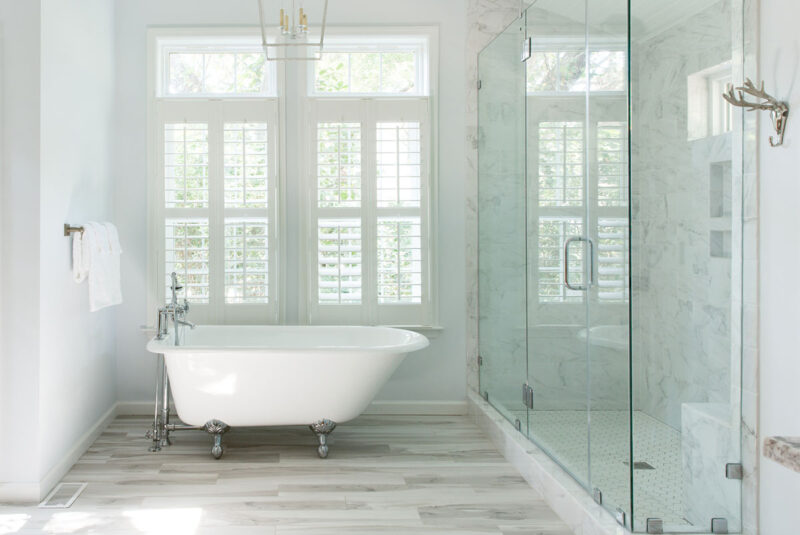Ready To Buy a Home?
Get Approved to Buy a Home
Rocket Mortgage® lets you get to house hunting sooner.
Have you ever thought less is more when it comes to the size of your home? Over the last several years, tiny homes have surged in popularity, helping accommodate the minimalist lifestyles of those who want to live simply, save money and reduce their carbon footprint.
Though tiny homes tend to cost less than average-sized homes, you still might want to get financing when you buy one. Since tiny homes are different from your average home, getting a loan to purchase a new tiny home might require some creative thinking.
But don’t worry – we’re here to give you options for financing your tiny home purchase in addition to providing the pros and cons to help you decide if a tiny home is right for you.
Can You Get a Tiny House Mortgage?
Getting a tiny house mortgage is unlikely. That’s because most traditional mortgage lenders will have certain requirements for financing houses that make tiny homes ineligible. These mortgage standards might include a:
- Permanent foundation
- Minimum of 400 square feet of living area (or a living area similar to comparable homes in the area)
- Minimum loan amount (this can often be less than the value of the average tiny house)
Even though you probably can’t get a mortgage on a tiny house, there are other loan types to help you finance a tiny house.
Chattel mortgages
A chattel mortgage is a type of mortgage usually reserved for manufactured homes and other large pieces of personal property, like a machine or industrial vehicle. In some cases, lenders might consider a tiny house a piece of movable personal property and offer a chattel mortgage as a financing option.
Besides a chattel mortgage, there are several other loans you can use to buy a tiny house. Let’s explore some of the common loan options used to buy tiny homes.
Tiny Home Financing Options
Finding tiny home loans shouldn’t be any more difficult than getting approved for most other loans. The type of financing you can use to buy a tiny home varies, but some of the more common options include personal loans, recreational vehicle (RV) loans and contractor or builder financing.
Personal loan
Personal loans are among the fastest, easiest and most popular ways to finance a tiny home. A personal loan offers you a lump sum of money that you pay back over time.
Personal loans are usually unsecured, meaning you don’t offer the lender any collateral if you default on the loan (this is the opposite of a mortgage, where the home is used as collateral to secure the loan).
The terms of a personal loan depend on how much money you borrow, your credit, debt-to-income (DTI) ratio and other factors. In addition, the repayment period of personal loans is often shorter than other loans, ranging from 12 – 60 months.
To qualify for a personal loan, most lenders will require proof of income and look for a strong credit history (think 600s and up) and a low DTI ratio (ideally 36% or less, but that’s not a hard limit).[1]
If you’re considering applying for a personal loan, you can use our complete guide on how to get a personal loan to help you through the process.
RV loan
If your tiny home has wheels and you’re planning on hitting the road, an RV loan might be perfect for you. An RV loan is like a mortgage for your RV. Though this home can move like a vehicle, it shouldn’t be confused with a car loan.
Many RV loans are secured by the RV itself, but there are RV loans that are unsecured, too. Know that if you choose an unsecured loan, you’re almost always going to pay a higher interest rate compared to a secured loan.
Most RV loans fall in the range of 5 – 20 years. To qualify for an RV loan, you’ll usually have to put down 10% – 20% of the RV’s cost and provide proof of income and assets. To get the best RV loan rate, you’ll also need a good or very good credit score, such as 680 or even 700.
If you want to learn more about RV loans, we’ve got you covered! Here’s everything you need to know about financing your camper.
Contractor or builder financing
If you’re building your tiny home, contractor or builder financing might be a viable option. Some builders and contractors will offer tiny home buyers the option to finance the home with them, which they usually do by partnering with a lender.
Since contractors or builders can team up with any number of lender partners to help you finance a tiny home purchase, the qualifications, rates and terms can be very different.
Build a tiny home with your home equity
If you already own a home, you may be able to use a home equity loan or a cash-out refinance to build a tiny home as an addition on your existing property. Keep in mind that lenders have certain loan-to-value requirements, so you’ll want to have 20% – 25% equity in your home before applying for a home equity loan.
Regardless of what you choose to use it for, building a tiny house on your property can be a great addition to your primary residence. A tiny house can be used as:
- An in-law/granny suite
- A rental property that produces income for you
- A man cave, she shack or other private space
- A guest house for friends and family visiting from out of town
Is a Tiny Home Right for You?
Now, the big question: is a tiny home right for you?
PROS of a Tiny Home👍
Tiny homes almost always come with a lower price tag than traditional homes. A traditional home will easily cost a few hundred thousand dollars, whereas tiny homes are readily available under $100,000.
Because they are smaller than traditional homes, tiny homes tend to have lower taxes and are less expensive to maintain, heat and cool.
In the case of an RV, you might not have to pay any property taxes.
If you’re concerned about eco-friendly living, a tiny home will have a smaller carbon footprint than the average home.
Tiny homes require minimal furniture, which means they’re cheaper and easier to furnish. No pricey dining room tables or bulky couches to worry about here!
People who have tiny homes seem to love that they can live a simpler life and worry less about money. A larger home has its benefits, but a tiny home can relieve you of many responsibilities that come with additional living space.
CONS of a Tiny Home👎
It should go without saying that a tiny home isn’t ideal for hosting family or friends. At less than 400 square-feet, even a gathering of just a few friends can be challenging.
You have to be extremely selective about each item you bring into your tiny home. Storage space is extremely limited in a tiny house, which means you can’t stash things away in the basement, attic or closets.
Tiny homes may not have the same resale value as a traditional home that’s just smaller than average. Not everyone wants a tiny house. Even though it might work well for you, the pool of buyers looking for only a few hundred square-feet of space may be more limited.
Tiny Homes, Big Possibilities
Tiny homes might appear diminutive, but fans of the tiny-home movement tout the endless possibilities of living in a smaller, simpler space. A tiny home can free you from some of the obligations of a traditional home while freeing up cash you can spend elsewhere or save. But as with all things, a tiny home isn’t perfect. So make sure you think long and hard before downsizing to a tiny home.
Take the first step toward buying a home.
Get approved. See what you qualify for. Start house hunting.
The Short Version
- Most traditional mortgage lenders will have certain requirements for financing houses that make tiny homes ineligible
- Even though you probably can’t get a mortgage on a tiny house, there are other loan types to help you finance a tiny houses
- If you’re looking to finance a tiny home, most lenders will want to see a minimum credit score in the 600 – 700 range
Experian. “What Credit Score Is Needed for a Personal Loan?” Retrieved July 2022 from https://www.experian.com/blogs/ask-experian/what-credit-score-is-needed-for-a-personal-loan/




